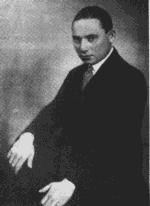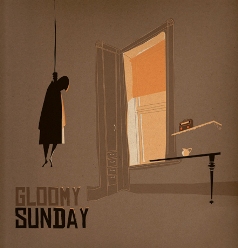Gloomy Sunday
Today I want to present one of the saddest songs and a one without even an ounce of hope in it. It is called
Gloomy Sunday .
The authors were two Hungarians Rezső Seress – music and Laszlo Javor – lyrics.
Seress was born in 1889. He was a self-taught musician; he learnt to play piano fairly well, although he wasn’t a virtuoso. In early 1930s he searched for luck in Paris. His aim was to become a songs composer. His first attempts were not successful. All the compositions he sent to the French publishers were returned. They weren’t received well. His girlfriend tried to persuade him to find a normal job. She even presented him with several employment opportunities, which she had managed to find through friends and acquaintances. Her mission was not successful – Seress wasn’t willing to give up his dreams.
Gloomy Sunday
The lack of recognition caused his general mood to become low. One morning in December 1932 he sat down in front of the piano and started to play a strange, melancholic melody. Looking out of the window, he saw dark clouds gathering in the sky, and after a while the rain came down, accompanied by strong wind. 'What a gloomy Sunday', he said to himself. After playing some more he decided, that 'Gloomy Sunday will be the title of my new song'. Half an hour later the job was done – both the music and lyrics. Seress was very pleased with it.

Rezső Seress
He took a blank sheet of paper and wrote down neatly the notes and the text of his new song, and posted it to a well-known publisher. This time he felt confident it would be a success. After a few days he received the song back with a note, stating that the composition was quite good, but the melody and rhythm were too depressing for publication. Seress sent his work to another company. This time it worked. The song was published in the biggest cities of France in 1933.
Soon after that Seress was paid a visit by Laszlo Javor, who showed him his own version of lyrics in Hungarian. Javor had just been dumped by his fiancée, which left him in great despair. Seress’s own lyrics seem not to have been particularly good, as they were quickly forgotten. The words written by Javor turned out to be incredibly powerful. His version of the song was recorded in Hungary in 1935 by Pal Kalmar. The results were unexpected.
During the following several months there were 17 suicides, which were committed either after listening to the song, or were directly related to it. This number cannot be verified now, as the Hungarian are notorious for the higher number of suicides than in other countries, however, the situation must have been extraordinary, since the Hungarian authorities banned performing of the song, titled Szomorú vasárnap, in public. It is said that before it happened, the number of suicides had reached 100. One of the victims was supposed to be Javor’s ex-fiancee. In a bar in Berlin one of the guests requested the performing band to play Szomorú vasárnap for him and when it ended, he immediately went outside and shot himself in the head.

There are few things, which can help a song gain popularity, other than a tragedy related to it. No wonder then, that the reports found in Hungarian press were re-printed by newspapers in many other countries in the world. Many people were understandably curious what it was in the text, which had such shocking effect. Sam M. Lewis and Desmond Carter undertook the task of translating the text into English. Lewis’s version was more popular and it was the one used in the recording in the USA in 1936 by Hal Kemp and his Orchestra with the vocal of Bob Allen. In the same year the song was recorded by Paul Whiteman’s orchestra with the singer Johny Hauser.
The curse continued to strike also in America. A week after publication a shop assistant was found hanged in her workplace. The investigation concluded a suicide and since the notes of Gloomy Sunday were found at the scene, the death was also associated with the song. Two days later in New York a secretary of a big agency gassed herself to death in her flat, and she had left a suicide note, stating her wish, that Gloomy Sunday would be played at her funeral. Soon after, also in New York, two suicides took place, in which the victims jumped out of skyscrapers’ windows, and a close connection to the song was found by the police.
Journalists started to observe similar incidents also in Europe, which soon started to happen. There was a notorious suicide of a woman in London. The sounds of Gloomy Sunday played out loudly on gramophone came from her flat all day. When an irritated neighbour knocked on the door, there was no answer. The door was knocked down and the lady tenant found dead. It’s hard to say how true the estimates are, which imply that in the English-speaking countries there were around 200 suicides caused by this “deadly” song.
These reports, however, were treated as seriously as they were previously in Hungary. BBC banned the song from being played in music programmes and so did several radio stations in the USA. Some bands played only the instrumental version of the song. The tragic wave was stopped by the Second World War. There were many more important subjects to be reported in the media that time.
The matter resurfaced in 1941 after Billie Holiday recording, the most famous version of Gloomy Sunday. There were a few victims among young female jazz fans, although they weren’t widely reported. In 1944 fascist authorities in Hungary were sending militants across Europe to murder their enemies. Both authors of this song were such enemies. Laszlo Javor became one of the victims. Seress survived the war, but his mother shared Javor’s fate. Seress himself followed the song’s curse in 1968. He jumped out of the window of his home in Budapest. He died on the scene.
The original song was featured in German-Hungarian film Gloomy Sunday - Ein Lied von Liebe und Tod in 1999.
I don’t know if it’s the dark past or the beauty of the song, that it has been constantly recorded until the present time. The lyrics have been translated into many languages, even such “exotic” ones as Japanese and Finnish. The charm or magic of the piece still has its power, although without these most dangerous consequences.
In the music box Paul Whitemann Orchestra from 1936 (I like it very much), Billie Holiday and a few other famous artists. Kronos Quartet is also worth attention.
Gloomy Sunday as sang by Billie Holiday. She added the third part which weren’t included in Lewis’ version.
Sunday is gloomy,
. My hours are slumberless
Dearest the shadows
I live with are numberless
Little white flowers
Will never awaken you
Not where the black coaches
Sorrow has taken you
Angels have no thoughts
Of ever returning you
Wouldnt they be angry
If I thought of joining you?
Gloomy sunday
Gloomy is sunday,
With shadows I spend it all
My heart and i
Have decided to end it all
Soon therell be candles
And prayers that are said I know
But let them not weep
Let them know that Im glad to go
Death is no dream
For in death Im caressin you
With the last breath of my soul
Ill be blessin you
Gloomy sunday
Dreaming, I was only dreaming
I wake and I find you asleep
In the deep of my heart here
Darling I hope
That my dream never haunted you
My heart is tellin you
How much I wanted you
Gloomy sunday
Szomorú vasárnap, original javor's lyrics
Szomorú vasárnap száz fehér virággal
Vártalak kedvesem templomi imával
Álmokat kergető vasárnap délelőtt
Bánatom hintaja nélküled visszajött
Azóta szomorú mindig a vasárnap
Könny csak az italom kenyerem a bánat...
Szomorú vasárnap
Utolsó vasárnap kedvesem gyere el
Pap is lesz, koporsó, ravatal, gyászlepel
Akkor is virág vár, virág és - koporsó
Virágos fák alatt utam az utolsó
Nyitva lesz szemem hogy még egyszer lássalak
Ne félj a szememtől holtan is áldalak...
Utolsó vasárnap
english translation
Gloomy Sunday with a hundred white flowers
I was waiting for you my dearest with a prayer
A Sunday morning, chasing after my dreams
The carriage of my sorrow returned to me without you
It is since then that my Sundays have been forever sad
Tears my only drink, the sorrow my bread...
Gloomy Sunday
This last Sunday, my darling please come to me
There'll be a priest, a coffin, a catafalque and a winding-sheet
There'll be flowers for you, flowers and a coffin
Under the blossoming trees it will be my last journey
My eyes will be open, so that I could see you for a last time
Don't be afraid of my eyes, I'm blessing you even in my death...
The last Sunday
Last Updated (Saturday, 14 March 2015 17:25)








